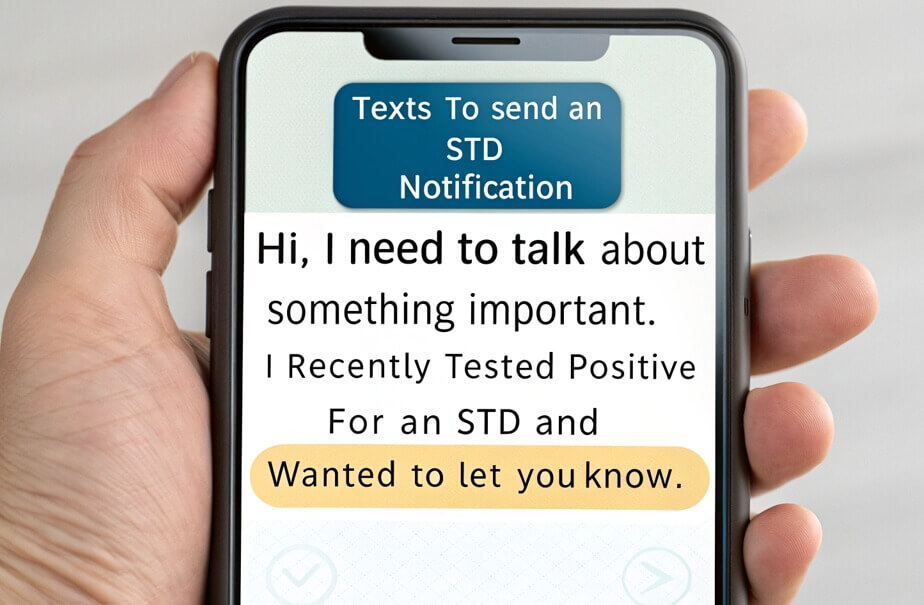HPV is a type of sexually transmitted infection that can spread during intercourse. Having HPV does not preclude someone from dating or having sex. They might, however, want to take preventative measures or tell sexual partners they have HPV.
Telling a partner about HPV can feel overwhelming—but it’s more common than you think. Human papillomavirus (HPV) is the most widespread sexually transmitted infection, with nearly 80% of sexually active people contracting it at some point.
Take a deep breath and repeat after me: It’s not a big problem.
If you’re wondering how to tell your partner you have HPV, this guide will help you do it with clarity and care.
Should You Tell Your Partner About HPV?
If you’re asking yourself, “Should I tell my partner I have HPV?”—you’re not alone. People do not necessarily have to tell their past or present sexual partners that they have HPV because there’s no legal obligation.
Whether or not a person discloses their HPV status to a partner is up to them. Some people may not be aware that they have HPV because they don’t exhibit any symptoms. If someone learns they have a sexually transmitted infection (STI), such as HPV, it might be prudent to let their sexual partners know.
Being truthful enables a prospective partner to decide for themselves whether or not they may be exposed to HPV prior to any sexual interaction. So, when this thought crosses your mind, “do I have to tell my partner I have HPV”, do think about the ethical considerations and the implications it can have for others.
4 Things You Should Know Before Telling Partner About HPV
Before you go down the awkward conversation road, here’s what you need to know about HPV:
1. Understanding HPV
The term “HPV” describes a collection of over 100 viruses. Sexually transmitted infections (STIs) are thought to include about 40 strains. In the US, HPV is the most prevalent STI. Currently, a strain of the virus is present in about 80 million Americans. Every year, an additional 14 million Americans become infected.
Chances are that just about every individual who has sex will at some point be infected with HPV. Furthermore, anyone who has sex is at risk for contracting the virus or passing it to a partner.
2. Learn About the Transmission Methods
HPV isn’t one of those viruses limited to one form of intimacy—it jumps silently and effectively between various modes of contact. Being aware of how it is transmitted helps both you and your partner make rational choices without fear-based assumptions.
Sexual contact is the most common way that it is spread. This would include vaginal, anal, and oral sex. What surprises many people is that you do not actually have to have sex in order to pass HPV. Skin contact will do. The virus can be transmitted through close personal contact even with no visible symptoms. This means that even people who have been using protection, or have not had traditional ‘sex’, can still get or spread HPV.
Knowing this allows you to approach the conversation with facts, not fear. It shifts the tone from “I have HPV should I tell my partner” to “Here’s something important I want us to know”.
3. Protection and Testing
When it comes to HPV, no means of protection is absolute, and this is a point that one has to be sure of before talking it over with your partner. Condoms and dental dams lower the danger, though they cannot stop transmission entirely because HPV is able to infect areas not covered by these barriers. As such, there still remains a possibility, albeit minimal, of getting exposed despite practicing safe sex.
Testing is another consideration. HPV is routinely found in women through a Pap smear or an HPV test. This especially happens in their 20s and 30s. But, for men, there is no routine screening. The only time one may get tested is when there are signs and symptoms of the virus-like warts. That can make it frustrating because it’s possible to carry and transmit HPV without ever knowing you have it.
Understanding these limits helps frame the conversation. It’s not about blaming—it’s about knowing, preventing, and caring.
4. Implications for Partners
You should expect people to have questions when you tell them that you have HPV.
Reassure them with facts. Most HPV infections come and go on their own; this is often without presenting any signs or symptoms in a person. With those few who the virus stays in, regular screening and follow-up will go a long way in early detection and management of any changes, especially in such women at risk of complications in the cervix.
Approach the conversation with calm confidence. You’re not handing over a problem—you’re opening the door to shared health awareness and trust.
Disclosing HPV to Partner: 5 Effective SMS Scripts
Telling a partner you have HPV can feel embarrassing. But sharing this news with clarity and empathy goes a long way. Below are five SMS scripts to help you communicate your status in a way that’s respectful, informative, and humane.
1. The Straightforward & Honest Message
So I got my test results back, and it turns out I have HPV. The doctor prescribed something for me for [INSERT NUMBER OF DAYS] days, and it’s totally treatable. I am going to get retested to make sure it’s gone in [INSERT NUMBER OF DAYS]. If you have any questions at all, don’t hesitate to ask.
2. The Supportive & Reassuring Message
My HPV test results were positive. I gathered as much information as I could regarding my treatment, the implications for our sexual life, and any safety measures we need to take, since I care about you. First, what would you like to know?
3. The Educational Script
My STI test came back negative, but we both need to continue getting tested frequently and take precautions to keep ourselves safe. This is what the doctor suggested…
4. The Gentle Conversation Starter
I have something to tell you that’s health-related—not urgent, but I want to be transparent with you. I hope we can talk about it with an open mind.
5. The Anonymous-Friendly Script
You’ve been in contact with someone who tested positive for HPV. Most cases clear up naturally, but it’s good to know and stay proactive about your health. Learn more or get checked if you’re concerned.
These scripts are flexible. Feel free to adjust the tone based on your relationship dynamic. The key is honesty, paired with compassion. If you’re feeling too nervous to send a message yourself, you can use a discreet service like Tellyourpartner to notify them anonymously.
Convenient Tool: Anonymous STD Notification
Texting the HPV news is always an option if you don’t want to tell your partner face-to-face. And there’s anonymous messaging as well. Anonsms or Tellyourpartner allows you to send a message without revealing your identity. The bottom line is that you must convey your infection to those concerned so that they may also take caution.
FAQs
Does HPV need to be reported?
No. There is no need to report HPV. It is advised to seek advice from a professional and notify the partner you’ve been having sex with.
Is it a legal obligation to disclose HPV?
No. You have complete control over this conversation. The majority of HPV-infected men and women are unaware that they have the virus. Benefits of providing the information include increasing awareness of HPV and the fact that honesty is frequently the best policy.
Can you get in trouble for not disclosing HPV?
Since there are no legal obligations to disclose HPV, you won’t get into any kind of trouble for keeping it to yourself. However, being honest about it gives the other person enough time to get tested and treated for it.
Does my partner need to be tested if I have HPV?
Maybe. HPV doesn’t work like most infections. There’s no standard HPV test for men, and most HPV types clear on their own. For women, regular cervical screenings (Pap smears) are the best way to monitor HPV-related health.
Is having HPV shameful?
No. Absolutely not. Shame thrives in silence. But HPV thrives in almost everyone. Nearly 80% of people will have it at some point. That’s not shameful—that’s normal. Let’s stop whispering about something that most people will experience. You are not alone.
Related Articles:
STIs vs. STDs: The Difference Matters for Relationship Health
Anonymously Text Your Partner About an STD
Texts to Send an STD to Your Partner? [Anonymou Ways]

 Anonsms
Anonsms
 TellYourPartner
TellYourPartner




